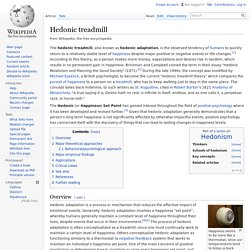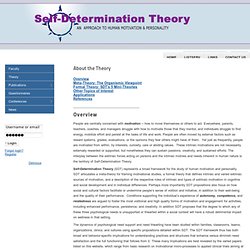

HabitRPG – bo życie jest jak jeden wielki erpeg. Using the new Positive Psychology. Readings in Positive Psychology. Planet OpenBadges. Game Studies. Hedonic treadmill. The Hedonic (or Happiness) Set Point has gained interest throughout the field of positive psychology where it has been developed and revised further.[3] Given that hedonic adaptation generally demonstrates that a person's long term happiness is not significantly affected by otherwise impactful events, positive psychology has concerned itself with the discovery of things that can lead to lasting changes in happiness levels.

Overview[edit] Happiness seems to be more like a thermostat, since our temperaments tend to bring us back towards a certain happiness level (a tendency influenced by carefully chosen activities and habits). Hedonic adaptation is a process or mechanism that reduces the affective impact of emotional events. Hedonic adaptation can occur in a variety of ways. Major theoretical approaches[edit] Behavioral/psychological approach[edit] Major empirical findings[edit] Wildeman, Turney, Schnittker (2014) studied the effects of imprisonment on one’s baseline level of well-being. Call for Participation. Welcome to Kevin Werbach's Website. Theory. About the Theory Overview Meta-Theory: The Organismic Viewpoint Formal Theory: SDT’s 5 Mini-Theories Other Topics of Interest Applications References Overview People are centrally concerned with motivation -- how to move themselves or others to act.

Everywhere, parents, teachers, coaches, and managers struggle with how to motivate those that they mentor, and individuals struggle to find energy, mobilize effort and persist at the tasks of life and work. People are often moved by external factors such as reward systems, grades, evaluations, or the opinions they fear others might have of them. Self-Determination Theory (SDT) represents a broad framework for the study of human motivation and personality. The dynamics of psychological need support and need thwarting have been studied within families, classrooms, teams, organizations, clinics, and cultures using specific propositions detailed within SDT.
Meta-Theory: The Organismic Viewpoint SDT is an organismic dialectical approach. References. Social Engagement: who’s playing? how do they like to engage? Many people are familiar with Bartle's Player Types: Achiever, Explorer, Socializer, and Killer. These canonical descriptions evolved out of social patterns that Bartle observed in early MUDS (multi-user dungeons AKA text precursors of MMOs like World of Warcraft). Many game designers (myself included) use this model to plan, design and tweak multiplayer games like MMOs.
A key value of Bartle's system is to raise awareness that different people enjoy different types of fun. It's also useful for de-bugging some of the more simple-minded thinking around gamification - particularly the limited appeal of Achiever-style point, badges and levels.